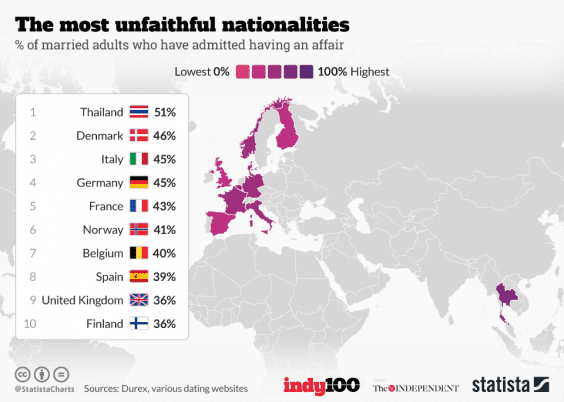Which MBTI Type is the biggest cheater?
Aside from open marriages and other polyamorous relationships, most romantic partnerships are formed under terms of sexual and emotional exclusivity. Faithfulness in a relationship is generally the one most hallowed tenet in a monogamous arrangement and when it is breached, a line is crossed that will often spell the death of the union.
Cheating is a betrayal of trust that is recognized as immoral around the world and yet it is still very prevalent. According to infidelity statistics found at Statistic Brain, over 50% of men and women admitted to having cheated on their partners.
In a survey conducted by Durex showing adultery rates by country, the top 10 most adulterous countries are:

- most unfaithful nationalities
- Thailand – 51%
- Denmark – 46%
- Italy – 45%
- Germany – 45%
- France – 43%
- Norway – 41%
- Belgium – 40%
- Spain – 39%
- United Kingdom – 36%
- Finland – 36%
There are studies surrounding the psychology of infidelity in both male and females. From a Myers Briggs standpoint, any personality type could conceivably cheat on their partners, but the conditions by which they might do so probably differ.
Ultimately, it is more likely that factors such as maturity, upbringing, culture, environment and the personal experiences of each individual along with pathological abnormalities they possess that would be the biggest influences on a person’s potential of cheating.
For example, in a study referenced by Psychology Today, travelling abroad was found to increase the likelihood of engaging in infidelity or immoral behavior. It was shown that when people travel and spend time with foreign cultures in foreign locations, it nurtures a mindset that is more creative and less biased toward outgroups. When in new and unfamiliar environments, a person’s thinking becomes more open and adaptive which might result in a departure from the cultural standards they are accustomed to. This cognitive flexibility, may also extend to moral flexibility and moral relativism, making unethical transgressions such as cheating or adultery feel less egregious or significant. What happens in Vegas stays in Vegas.
Personality Traits of a Cheater
There are a number of personality traits and attributes associated serial cheaters and It might be possible to correlate or map some of those infidelity personality traits with the Myers Briggs cognitive functions. Here is a look at the psychology of chronic cheaters and an assessment of which Myers Briggs personality is most liable to commit adultery.
Common traits of people who cheat:
- Narcissism
- Proclivity for Lying
- Sociopathy
- Greed
- Flirtatiousness
- Insecurity & jealousy
Extraverts More Likely To Cheat Than Introverts
The dailymail posted an article citing research that found extraverted or “outgoing” people were more likely to engage in short-term mating strategies (ie. one night stands) even while in a long-term committed relationship. The study determined that outgoing, confident people exhibited more narcissistic and psychopathic personality traits than less outgoing people and they felt less guilt over the idea of cheating on their partners. Because introverts tend to be more conscientious and asocial, they are less likely to be promiscuous and betray the trust of their partners.
Serial Cheaters Are Sensation Junkies
Risk taking, sensation seeking, and addictive behavior as well as an inability to defer gratification is a red flag in a partner. Individuals who cheat in a relationship tend to have poor impulse control and are liable to give in to spontaneous urges. This characteristic would suggest extraverted sensing (Se) that has gone off the rails. From the perspective of type theory, this could arise in types with inferior Se such as INTJ or INFJ when they are under stress or existential crisis. Or it could manifest as a part of a dominant-tertiary loop in a type such as ESTP or ESFP where Se and their extraverted tertiary function are operating unchecked by their auxiliary introverted function.
In theory, a healthy well-integrated psyche requires a balance of extraversion and introversion. When an individual ignores their auxiliary attitude they become too extraverted or too introverted and they lose important input necessary for keeping them in a proper dialogue between their internal and external worlds. Too much extraverting leads to losing touch with themselves, who they are and figuring out their needs as individuals. Too much introverting shuts out feedback from the outside world necessary for keeping their perspectives consistent with and anchored in reality.
Cheaters Tend To Be Sexual Narcissists
Self-absorption and inflated self-importance are major factors in a person’s willingness to cheat. Sexual narcissism is associated with a higher risk of unfaithfulness in relationships. People with this trait exploit their partners sexually. They feel entitled to having their erotic needs met while ignoring or being inconsiderate to that of their partner’s. They also overestimate their abilities and express a grandiose belief in their own romantic prowess.
A narcissist’s lack of empathy and pre-occupation with their own interests at the expense of others makes it difficult for them to even recognize other’s needs as being real. They crave attention and admiration and if they receive it outside the relationship they will likely try to have their cake and eat it too. The types most likely to exhibit narcissism might be ENTP, ENTJ, INTJ, ENFP, ESFP and ESTP.
By my estimate, here are the the top 5 MBTI types most likely to cheat:
- ENTP
- ESTP
- ENFP
- ESFP
- ISTP
MBTI Types of Famous Cheaters and Adulterers
- Tiger Woods – ISFJ (source: celebritytypes.com)
- Bill Clinton – ESFJ (source: 16personalities.com)
- Kobe Bryant – ISTP (source: personalityjunkie.com)
- David Letterman – ENTJ (source: careerassessmentsite.com)
- Eliot Spitzer – ENTP?
- Anthony Weiner – ENTP?
- Arnold Schwarzenegger – INTJ (source: 16personalities.com)
- Ashton Kutcher – ISTP (source: celebritytypes.com)
- Kristen Stewart – ISTP (source celebritytypes.com)
- James Cameron – INTJ (source: celebritytypes.com)
Here is a look at the way in which each MBTI type might be tempted to have an affair or cheat on their partners.
INTP – As a perceiving type, the INTP may sometimes want to break away from their commitments and try something new, and this may very well apply to their relationships. Because they are introverted however, it is unlikely they will actively seek out or initiate a side relationship and even if they do, they will likely respect their partners enough to let them know before it gets too serious.
INTJ – The INTJ may be narcissistic enough to think they can get away with clandestine relations outside of their main relationship. They may even feel it justified if it is done out of retaliation for something the partner did or if they engage in a sexual encounter with someone that is just sex without emotional attachment or feelings.
ENTP – The ENTP is a rolling stone who is always seeking out greener pastures. Settling down for them feels restrictive and so it will take a very special person for them to lower their anchors and stay put. They get bored easily, and if they think they can strike a better deal with someone new they may cross some emotional lines with them before they decide to end their main relationship.
ENTJ – The ENTJ may be at risk of being unfaithful especially when they are in positions of power. Because ENTJs are among the top earning MBTI personality types, it is likely they may experience the temptations that often come along with power. Power is a potent aphrodisiac and many people will likely be drawn to them due to this which can present them with opportunities that they may struggle to ignore.
INFP – INFPs are likely to be true to their partner in a relationship because of a.) their preference to cling to the people they already know and love and b.) their sense of morality that is likely consistent with the “golden rule”. They know how gut wrenching heartbreak can be and they would not want to hurt or betray anyone they care about. It is only after they’ve been emotionally hurt or betrayed that they would consider cheating on their partner.
INFJ – INFJs have high ideals and they are tentative about entering into relationships until they are pretty sure they’ve got something good. That said, they are generally very committed once they fall in love with someone and they are probably more resistant to outside temptations. If anything they may have difficulty leaving a relationship that is not good for them and they are more likely to be the one giving their partners a second chance after being cheated on.
ENFP – ENFPs are known for being flirtatious and so this may present many opportunities for them to cheat. If they do not receive enough attention and appreciation from their relationships, they may be inclined to having an emotional affair with another person or satisfy the lack of sexual gratification they are not getting from their partner.
ENFJ – The ENFJ is likely to be very conscientious of their partner’s needs and feelings and thus will likely be faithful to them. However, because they are very engaging and affectionate with people, they may attract attention and admiration from people who want to be closer to them. They appreciate being appreciated and this can be a gateway to their heart which may lead to emotional and physical affairs.
ISTJ – Once an ISTJ decides to settle down they are typically content to love the one they’re with through thick and thin. They are very loyal and low maintenance in a relationship and probably resistant to the emotional impulses or urges that might tempt others to stray. They prefer stability and security though and may on occasion be tempted to upgrade to a new partner who is more mature and financially stable if their current partner can’t get their shit together.
ISFJ – An ISFJ is very dutiful and loyal in their relationships. In order for them to betray their relationship, it may require extensive neglect and unappreciation by their partner and a smooth operator who can make them feel appreciated the way they desire. They may be susceptible to committing emotional affairs with people who give them attention and make them feel special and valued.
ESFJ – The ESFJ is very loyal but they may be tempted to stray if their relationship partner is unsupportive. They can be insecure and their need for validation from others can open them up to desperate attempts of seeking approval. They are easily charmed by people they view as confident and exciting. Someone who can make them feel valued and validated has the potential of stealing their heart.
ESTJ – ESTJs are likely to be quite faithful and devoted to their relationships. They are not so inclined to flirt or seek emotional or sensual thrills. They may become susceptible to the advances of others especially when their responsibilities become stressful. A new love interest could then provide a welcome distraction and take their mind off of their troubles.
ISTP – ISTPs may have a more flexible attitude when it comes to how the game of relationships should be played. Even though they are prone to jealousy and fear of being cheated on, they may develop a dog-eat-dog perspective that may in their minds justify engaging in infidelity if they anticipate their partner might do the same if given the same opportunity.
ISFP – An ISFP can be insecure and paranoid over the faithfulness of their partners. Consequently, they may allow themselves to cultivate side relationships that could later become their backup plan should their main relationship fail. They may also engage in emotional affairs if they do not receive the type of emotional support they feel they deserve.
ESFP – ESFPs are fun and frisky and they crave attention and sensory stimulation. They are usually very friendly and open to everyone and many potentially romantic relationships form naturally from this. Sometimes the lines can get blurred for them and they may find themselves having crossed a line they did not intend to cross.
ESTP – ESTPs are impulsive and and may be more prone to getting swept up by the feeling of the moment without sufficiently considering the ramifications of their actions. They take pride in their image and appearance and it is likely that they receive attention for their attractiveness. Compliments about their appearance from the opposite sex are likely to be a major stroke to their ego that may encourage them to sabotage their relationships with risky liaisons .
Please share this post and subscribe for future updates 🙂
Related Posts:
- The Moral Compass of Each MBTI Type
- Secrets About Each MBTI Type
- How Each MBTI Type Processes Emotions
- What Each MBTI Type Seeks In A Soulmate
- The Fatal Flaw of Each MBTI Type In Relationships
- The Hidden Superpower of Each MBTI Type
- ISFJ and ISTJ in love: 5 Essential Dynamics of their Relationship - February 24, 2024
- ENTP and ENTJ in love: 6 Critical Dynamics of Their Relationship. - February 18, 2024
- ESTJ and ESFJ in love: 4 Key Aspects of their Relationship. - February 12, 2024






I don’t think you understand NT’s nor narcissism very well. Narcissism is having a grandiose opinion of oneself and essentially expecting to be worshiped by everyone just because they’re them, no matter how badly they behave or treat others. It doesn’t make NT’s narcissistic just because they don’t give a shit what you think about them; there’s a huge difference between not caring what others think of oneself and expecting to be worshiped by others. Only very immature and/or unhealthy ENTP, INTJ, ENTJ’s would treat their relationships the way you depicted. NT’s take their relationships and commitments very seriously. I know two NT’s that have been cheated on repeatedly by their partners but won’t leave their partners because they care about their relationships and the commitment they made to them. While your depiction might fit well for very immature and/or unhealthy NT’s, it’s an absurd depiction for NT’s that are relatively mature and/or heathy.
Agree 100%
ENFP true re emotional affairs & flirtatiousness. Have had to learn how to pull back early.
ESFPs should probably be at the top
You’re wrong on INTJ’s. I have never cheated in my life, and it is entirely incomprehensible for me. True INTJ’s are loyal to the extreme, take our relationships very seriously and are very picky for this reason. Also honesty is a given for a healthy INTJ and truth our centre, although we don’t expect the same in return as we know most people are not honest.